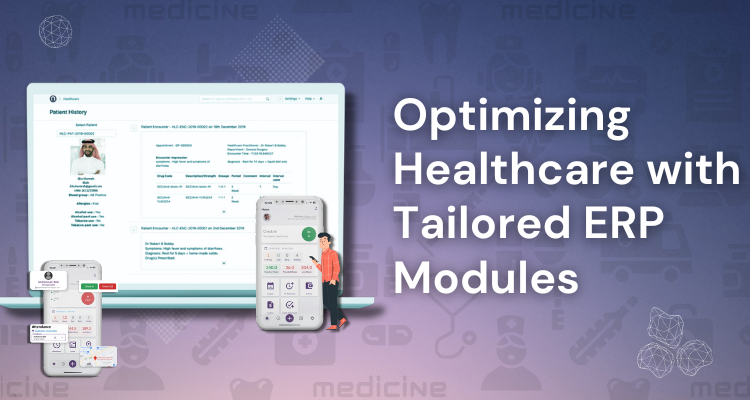
Technology is revolutionizing every sector, and healthcare is no exception. The implementation of ERP modules for healthcare is transforming the industry in Saudi Arabia. This blog delves into how tailored ERP modules optimize healthcare, the unique features and functionalities of healthcare ERP solutions in Saudi Arabia, and future trends to watch out for. It’s a comprehensive look at how ERP systems can enhance service delivery, improve efficiency, and contribute to patient satisfaction. We will also explore how these solutions can address common challenges in healthcare management, such as compliance, financial management, and resource optimization. With a focus on Saudi Arabia’s context, we will discuss the benefits of purchasing healthcare ERP solutions locally and the potential impact of future developments in this technology.
Streamlining operations with ERP modules for healthcare
ERP modules for healthcare are designed to streamline operations. They integrate various functions into a single platform, thereby reducing redundancy. These modules provide real-time access to patient data, enabling quick and informed decisions. Also, they help in tracking inventory levels, ensuring that resources are always available when needed. Furthermore, by automating routine tasks, these systems free up staff time, allowing them to focus on more critical aspects of patient care. The efficiency gained from using ERP modules can also lead to significant cost savings over time. Moreover, the ability to generate detailed reports helps healthcare providers identify areas for improvement and monitor progress towards their goals. Lastly, the integration provided by ERP modules enhances communication and collaboration among different departments, leading to more coordinated care.
Enhancing patient care through healthcare ERP in Saudi Arabia
The primary aim of any healthcare facility is to provide superior patient care. Healthcare ERP in Saudi Arabia is making this possible. It facilitates better coordination between different departments, leading to efficient service delivery. Additionally, it enhances the patient experience by ensuring timely communication and personalized care. With these systems, healthcare providers can maintain comprehensive patient records, leading to more accurate diagnoses and treatment plans. The use of ERP also allows for quicker response times to patient inquiries, boosting satisfaction levels. Moreover, the data collected by these systems can be used to identify trends and patterns, contributing to improved health outcomes over time. Lastly, by streamlining administrative tasks, ERP solutions enable healthcare staff to devote more time and energy to the patients themselves, enhancing the overall quality of care.
Improving financial management
Financial management is crucial for the smooth running of any healthcare facility. ERP modules for healthcare come with financial management features. These include billing, insurance claim processing, and budgeting. Consequently, healthcare providers can monitor their finances closely, ensuring sustainability. With these features, it becomes easier to track revenue cycles, manage accounts receivable and payable, and forecast financial trends. The use of ERP modules also reduces the risk of human error in financial calculations, enhancing accuracy. Furthermore, the ability to generate comprehensive financial reports aids in decision making and strategic planning. Lastly, the integration of financial data with other operational information provides a holistic view of the organization’s performance, helping to identify areas for cost optimization and efficiency improvement.
Facilitating regulatory compliance
Healthcare providers need to comply with numerous regulations. Non-compliance can lead to hefty fines and damage to reputation. ERP modules for healthcare aid in maintaining compliance by keeping track of regulatory changes. Furthermore, they generate reports that make audits easier. In addition, these systems can be programmed to send alerts whenever there is a deviation from set standards or procedures, allowing for immediate corrective action. The use of ERP modules also ensures secure data storage and handling, which is crucial for compliance with privacy laws. They can also facilitate the training of staff on new regulations, ensuring everyone is up-to-date with the latest requirements. Lastly, by automating compliance tasks, ERP modules relieve healthcare staff of this burden, allowing them to focus on their core responsibilities.
Features and functionalities of healthcare ERP solutions in Saudi Arabia
Healthcare ERP solutions in Saudi Arabia come with unique features and functionalities. They offer modules for patient management, human resources, supply chain, and more. These features enable healthcare providers to manage their operations more effectively and efficiently.
Purchase healthcare ERP solutions in Saudi Arabia
If you’re looking to purchase healthcare ERP solutions in Saudi Arabia, consider the specific needs of your facility. Look for solutions that offer customization. This way, you can tailor the software to match your workflows, ensuring maximum utility.
Future trends in healthcare ERP software in Saudi Arabia
The future of healthcare ERP software in Saudi Arabia looks promising. We expect to see more AI-powered modules that can predict patient needs and automate routine tasks. Also, there will be increased use of cloud-based solutions due to their scalability and cost-effectiveness.
Conclusion
ERP modules for healthcare are transforming the industry in Saudi Arabia. They streamline operations, enhance patient care, improve financial management, and facilitate regulatory compliance. Therefore, healthcare facilities looking to optimize their operations should consider investing in these solutions. The future trends indicate that these solutions will continue to evolve, becoming even more integral to healthcare delivery.
